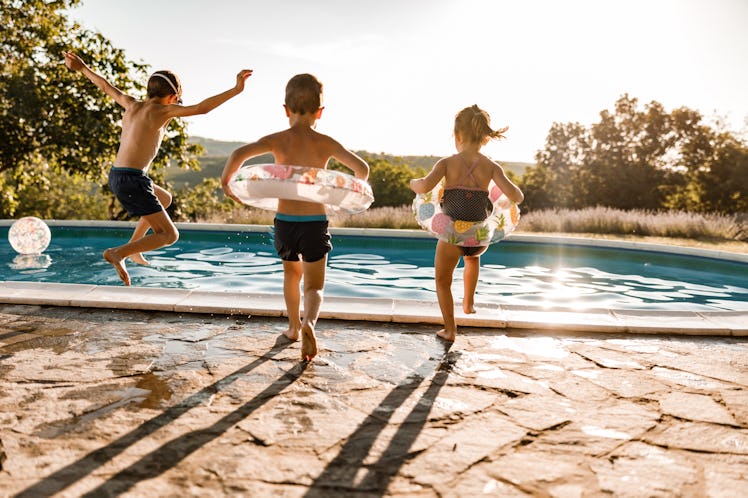Way Too Many Parents Let Their Kids Swim Unsupervised
An average of 10 children drown each day in the United States.

One third of American parents would allow their children to swim in a home, hotel, or neighborhood pool without adult supervision, according to a recent report. And, with an estimated 10.4 million residential and 309,000 public swimming pools in the United States, that means summer provides ample opportunities for a child to drown.
“A child, regardless of their ability to swim, should never be unsupervised,” warns American Academy of Pediatrics Fellow Dr. Sarah Denny in reaction to the report, which was based on responses from more than 1,500 parents of children ages 6 to 18. Denny, an emergency physician at Nationwide Children’s Hospital, explains that stationing a responsible, attentive adult poolside is key to preventing tragedies. “There are several layers of protection against drowning, with supervision being paramount,” she says.
A neatly enclosed and chlorinated body of water may be giving parents a false sense of security, the report suggests. Far fewer parents would forgo adult supervision in a lake or an ocean (16% and 13%, respectively). Unfortunately, water is water, and there is always some risk, whether it’s a pool, a lake, or even a toilet (yes, a toilet).
And children drown more often than most parents think. According to the Centers for Disease Control and Prevention, drowning is the second leading cause of injury-related death for children, with an average of 10 deaths per day in the U.S. alone.
The report also notes that a child’s ability to swim independently is a strong predictor of whether a parent would allow a kid to swim unsupervised. About 45% of parents with proficient swimmers would allow their kid to swim without oversight, compared to 13% of parents with a kid unable to swim.
Nonetheless “no one, regardless of age or swimming ability, should ever swim alone,” Denny says. She stresses that everyone should swim with a buddy who can get help in case of unexpected problems. Even Coast Guard-approved life jackets, Denny says, are no guarantee.
Denny advises both family swim lessons and designating a “water watcher” who is sober, able to call 911, over 16, knowledgeable about CPR, able to quickly grab a flotation device and, crucially, able to recognize even subtle signs of distress.
“Obviously it is different in different cases, but children tend to quietly slip under the water,” says Denny. “There is not a lot of splashing and yelling, as the child’s mouth is typically under the water.”
Bottom line? There’s only one thing that can guarantee water safety: parents making smart decisions. And although the report confirmed that 60% of the parents polled wished their children could swim better, it’s important to note that even this skill does not guarantee safety. That’s ultimately up to the parent.
This article was originally published on